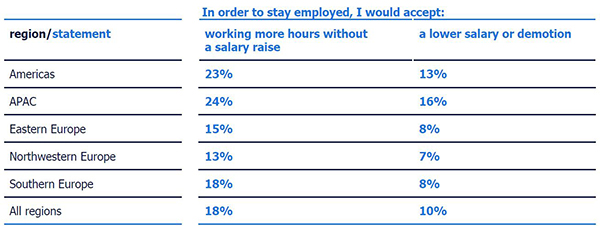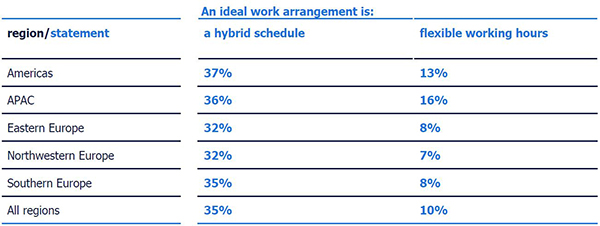workmonitor december 2020: despite uncertainty and sacrifices, workers feel emotionally supported by employers.
08/12/2020
This year, the outbreak of the coronavirus has taken an enormous toll on the global workforce, with billions of people facing restrictions and companies worldwide forced to operate in new and challenging ways.
Working from home is the new normal, and job security has become more important than ever as layoffs continue to occur in many organizations. Meanwhile, talent must learn to upskill quickly to remain relevant in a transformed digital economy. Further adding to a feeling of disruption, recent social justice movements have renewed efforts to ensure diverse and inclusive practices in the workplace.
The second edition of our semi-annual 2020 Workmonitor found both encouraging signs and a daunting outlook expressed by workers. Conducted in October in 34 markets, the data we collected indicates resilience among most respondents, but also concerns about the uncertainty surrounding the pandemic and their future:
- a strong majority (71%) say they feel emotionally supported by their employer during the pandemic
- 79% believe they have the equipment and technology needed to adapt to digitalization
- at the same time, 40% say they are struggling to learn new skills required in this new digital age.
The rapid adoption of technology has caused workers worrying about their employability, and that is only one reason why job security is top of mind for many. To stay employed within their organization, a larger percentage says they would be willing to take a different role or work more hours without additional compensation.
In just one year, the power appears to have shifted from workers who enjoyed a low unemployment rate before COVID-19 to employers who can pick from a larger pool of active job seekers. Even among those employed, there is concern about being laid off. These worries aren’t likely to go away anytime soon. Many issues disrupting the global labor market will remain for months to come as the world economy attempts to recover during an uncertain time.
balancing work and life
Before the outbreak of COVID-19, most workers understood and managed the demands of work and life in a predictable way. The pandemic has completely changed this. Our research sought to better understand how workers are coping with the challenges of COVID-19 both in their work and personal life.
While most say they feel supported by their employers, many also indicate they are willing to make concessions to keep their jobs. In fact, 18% of workers worldwide say they would be willing to work more or have logged more work hours without an increase in pay just to keep their job. Another 30% say they have taken or would take a different role within their company if asked to do so.

attributes of jobs after COVID-19
While job security undoubtedly is important during the pandemic, interestingly our data shows that workers aren’t overly concerned. When asked which attributes they want in their jobs after COVID-19 has passed, a little over one-third cited greater job security.
Workers believe employers may still have trouble finding the right talent during these times of higher unemployment. For sure, many of the skills companies needed before the pandemic are still in high demand, with some talent even more scarce. Some skills will be especially important in the post-outbreak economy because of the acceleration of digitalization.
successfully adapting to new ways of working
By many accounts, workers around the world have successfully adapted to new ways of working. It’s clear from our research that workers want to spend time in the office, if not for the social interaction, then for a distraction-free work space.
We found two arrangements most desired during the pandemic: 1) a hybrid work schedule that involves some days in the office and the other days at home; and 2) flexible work hours to better juggle home and professional life.
expanding the workplace conversation on diversity & inclusion
Even as the world adjusts to living under COVID-19, this year brought many other issues to the forefront of the labor market. Our research showed that, overwhelmingly, most workers (80%) feel their company offers an inclusive environment. The strongest evidence of this is through the training provided to employees, building a diverse workforce and creating elements of an inclusive environment. When asked what are the most important initiatives their employers can undertake to be more inclusive, a little more than one-third say building a diverse workforce is key.
workers desire more training and reskilling
With so many jobs lost this year, redeploying talent has become a priority for many companies and governments. This can only be possible through comprehensive efforts to reskill redundant workers. Even for those who remain employed, upskilling and reskilling are critical to having them contribute to an effective workforce and ensure they are employable in the future.
Our research showed that a large percentage of the global workforce is struggling with acquiring new skills needed during the pandemic. Regardless of location, at least one-third of survey respondents in every region expressed this concern.
Our Workmonitor showed that most workers believe updating the skills of the workforce should be a shared responsibility. Even looking beyond the pandemic, many workers feel they want a job that will help them remain relevant in the labor market. Among the employee value propositions they want most, more than one-third desire training on the job. Acquiring the skills they need to ensure future employability is clearly a strong desire among many workers, but even more important is their need for a safe working environment and employer assurances.
randstad workmonitor recurring observations.
job satisfaction, job change appetite and actual job change
One final piece of our research is a regular pulse check on job satisfaction. Surprisingly, we found little shift in behaviors over the past four years. The satisfaction rate with current jobs, the percentage of those who are seeking different opportunities and the portion of those who have actually changed employment in the past six months have remained nearly the same compared with 2017. It seems even a pandemic has not moved these numbers significantly.
You can read more detailed insights in the full report which can be downloaded from: https://www.randstad.com/workforce-insights/global-hr-research/randstad-workmonitor/
about the Randstad Workmonitor
The Randstad Workmonitor was launched in 2003 and now covers 34 markets around the world. The study encompasses Europe, Asia Pacific and the Americas. The Randstad Workmonitor was published four times a year until 2019, making both local and global trends in mobility visible over time. In 2020, half-year measurements have been carried out.
In addition to the rotating set of themed questions, the survey also addresses job satisfaction, captures the likelihood of an employee changing jobs within the next six months, and provides a comprehensive understanding of sentiments and trends in the job market. The study is conducted online among employees aged 18 to 65, working a minimum of 24 hours a week in a paid job (not self-employed). Minimum sample size is 800 interviews per market. The Dynata panel is used for sampling purposes.
The second full survey of 2020 was conducted in 34 markets from October 13 to 26, 2020.
about Randstad
Randstad is the global leader in the HR services industry. We support people and organizations in realizing their true potential by combining the power of today’s technology with our passion for people. We call it Human Forward. In 2019, we helped more than two million candidates find a meaningful job with our 280,000 clients. Furthermore, we trained more than 350,000 people. Randstad is active in 38 markets around the world and has top-three positions in almost half of these. In 2019, Randstad had on average 38,280 corporate employees and generated revenue of € 23.7 billion. Randstad was founded in 1960 and is headquartered in Diemen, the Netherlands. Randstad N.V. is listed on the NYSE Euronext (symbol: RAND.AS). For more information, see www.randstad.com
for more information
Elise Martin-Davies/Robin den Hoed
+31 20 569 1732


